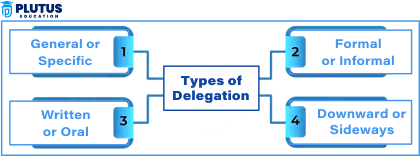Authority delegation types refer to how managers can delegate rights to subordinates. Delegation of authority is defined as assigning work to other people, decision-making, and providing resources to accomplish work efficiently. Managers allocate authority depending on the person’s skills, experience, and job needs. An organization has different types of authority delegation based on how authority is shared. There are general authority delegation, specific authority delegation, formal authority delegation, informal authority delegation, downward authority delegation, upward authority delegation, lateral authority delegation, and functional authority delegation. All explain and define how the responsibility and authorities should be distributed within an organization so that they can effectively ensure that performance is carried out smoothly.
Organizations work smoothly because of delegation. The manager’s burden is reduced, and decisions are enhanced. It brings employees more confidence and effectiveness when taking up responsibilities. Knowledge about delegation’s meaning will also require team management. Thus, this article intends to provide details of the types of authority delegation and their importance to managers.
What Does it Mean to Delegate?
Delegation of power is when the manager delegates specific tasks to the subordinates but keeps the responsibility higher. It ensures that work is done without burdening one individual. Managers grant employees the authority to make decisions within a specific limit, thus leading to better coordination and quicker execution.
Delegation demands mutual trust between the managers and employees. The manager needs to clearly define what tasks are being delegated to the subordinates so that they understand their roles. Delegation does not give away power altogether but shares it fairly to enhance Efficiency. Proper delegation ensures that the right people handle the right thing with minimum errors and maximum output.
It gives employees power when they gain authority. The employees will be motivated and may grow their leadership in this process. Efficient delegation of authority will further ensure an organization’s easy flow of information. The class will classify the delegation of authority and needs of the company’s class.
What is Delegation of Authority?
Management refers to the process whereby a manager delegates specific tasks, decision-making authority, and responsibilities to subordinates while being accountable for everything. This gives the managers more time to attend to their jobs’ core functions while ensuring the employees improve their skills and can complete assigned tasks correctly.
Definition of Delegation of Authority
The systematic process of assigning tasks, providing the necessary resources, and granting decision-making rights to subordinates while ensuring accountability. It is a structured way of dividing work to increase operational Efficiency in an organization.
Example: In a corporate setting, the department manager might delegate the task of preparing the monthly reports to the senior employee in the organization. This also saves the manager’s workload and allows subordinates to build analytical and leadership skills.
If correctly done, the delegation improves teamwork, increases Productivity, and develops a robust management system in an organization. It helps the employees gain experience in handling responsibility independently, which makes them more ready for future leadership positions. In addition, delegation strengthens organizational Efficiency by allowing each level of management to focus on their primary tasks.
Types of Delegation of Authority
There are various types of delegation of authority about how managers grant power and work to subordinates. The delegation structure depends on the organization’s size, goals, and management style. The knowledge of the types of delegation of authority in management helps companies to delegate work accordingly. Effective delegation ensures that correct control and independence levels are achieved. The kinds of delegation of authority are detailed below.

General/Specific Delegation of Authority
General delegation of authority includes managers giving extreme responsibility to subordinates. In this type, the employees obtain control over the entire department or function instead of doing just specific jobs. More power is also conferred upon them by the manager so that they may make their own decisions and do not need approval for each step.
This form of delegation is ordinarily used in large firms where the managers cannot keep track of everything.
Example
For instance, a regional manager delegates power to store managers and monitors day-to-day activities. The store managers make decisions about hiring and firing individuals, sales start, and customer service without asking the regional manager about everything they wish to do.
Advantages and Disadvantages
General delegation of authority increases Efficiency and allows the senior management to focus on more important decisions. Employees are responsible and proactive, which improves business performance. Such delegation requires effective communication to avoid any miscommunication.
One disadvantage of this kind of delegation is that employees may abuse their authority if it is not guided appropriately. Organizations prevent this through proper boundaries in the exercise of decision-making power. While subordinates attend to routine affairs, they have to bring urgent matters to the attention of the top management.
Formal Delegation of Authority
Formal delegation of authority occurs when an organization formally distributes its responsibilities and duties to its employees. The company formalizes these roles through the job description, policies, and workflow structures. The employees know their authority, accountability, and reporting hierarchy.
In formal organizations, such a delegation occurs where everyone has a specified role. Different levels of people have powers attributed to their position.
Example
For instance, in the hospital, senior doctors can depute subordinates, such as junior doctors and nurses. In that case, everybody’s role and responsibility are clear.
Advantages and Disadvantages
Formal delegation of authority reduces confusion since every employee knows their duties. It also ensures accountability since employees are tied to specific roles. However, decision-making may slow since employees must follow strict procedures before taking action.
Companies with a strict chain of command prefer formal delegation of authority. This is because it maintains order, prevents unauthorised decision-making, and ensures that tasks are aligned with company objectives. Employees must adhere to the chain of command, which sometimes delays quick decisions.
Informal Delegation of Authority
Informal delegation of authority is the task assignment the manager gives out without adhering to the formal procedures. The informal delegation is flexible, so managers assign duties as necessary. It is given to employees on trust and relationships rather than the job description in writing.
Example
For instance, in presentation cases, a marketing manager can delegate it to a member to present it to him. Even though this will be outside their job description, they will succumb to trust. Informal delegation allows managers to distribute the workload effectively without causing bureaucratic red tape.
Advantages and Disadvantages
This kind of delegation is helpful in fast-paced environments where speedy decisions must be made. This enables organizations to respond immediately to sharp changes without halting workflow. However, since this is not an official delegation, conflicts usually arise about accountability. Employees are loaded with extra work without a clear guide.
Managers should ensure no contradiction in an informal delegation of authority. Though it presents flexibility, some structural aspects should exist to avoid mismanagement. Proper communication between managers and employees ensures the handling of tasks adequately.
Downward Delegation of Authority
Downward delegation of authority is an organisation’s most widely utilised form. Senior managers delegate responsibility to subordinates and ensure they spread the work appropriately. Lower-level employees get the authority to perform specific jobs while reporting to their supervisors.
Example
For instance, a head of the department may forward daily running to team leaders. Team leaders are responsible for their teams and do what is necessary so that work is done correctly. In this scenario, managers would focus on formulating strategy and policy while employees handle routine work.
Advantages and Disadvantages
Downward delegation of authority ensures that minor tasks burden the managers. Again, it provides opportunities for employees to develop leadership. Performance must be checked to ensure employees are not misusing their authority.
Proper training and supervision make the downward delegation of authority effective. Organizations should ensure that subordinates know what they are expected to do and have all the resources to do their jobs effectively.
Features of Delegation of Authority
The characteristics of delegation of authority define how the process works and why it is essential in an organization. Effective delegation of authority ensures a smooth transfer without confusion or inefficiency.
Clear task assignment
Managers delegate specific tasks to subordinates to avoid vague expectations. The delegated work should clearly define the tasks involved to avoid confusion. If the employees know what they are required to do, they work effectively. A defined task also saves from conflict and overlap in the duties. Delegation of functions with clear instructions helps to ensure responsibilities and enhances the process of assessing performance.
Authority with Responsibility
Delegation includes the grant of authority and concomitant responsibility. The employee should have decision-making power about their assigned work. Without proper authority, employees will likely find it challenging to get their job done. In cases where responsibility and authority go hand in hand, employees become confident and independent in their tasks. Organizational harmony is thus enhanced, and employees develop independent decision-making.
Accountability Lies with the Superior
Although work is delegated, the manager will be held accountable. If the subordinate fails, the manager must still account for the results. This allows the manager to supervise the work and guide the subordinates when needed. A good manager offers support, feedback, and training for the subordinates to ensure they complete the tasks successfully. Accountability ensures that delegation does not become an excuse to shirk responsibilities.
Trust-Based Process
The task of delegation necessitates trust. Managers need to believe that employees can get things done efficiently. Trust motivates employees to work well and take ownership of their jobs. The employees are unlikely to feel empowered and motivated when there is a lack of confidence. Organizations see better teamwork, and a culture of trust improves job satisfaction.
Two-Way Communication
Delegation cannot be a one-way process. Managers and their subordinates should communicate regularly to implement delegated tasks successfully. Open communication allows employees to solicit clarifications and for their side as well. It enables managers to review the progress and make changes if necessary. An effective workplace with proper communication practices results in fewer errors and misunderstandings.
Types of Delegation of Authority FAQs
- What is delegation?
Delegation refers to the process of assigning different tasks and responsibilities to subordinates while maintaining control in a general sense.
- Mention types of delegation of authority
There are different types of delegation of authority in management:- General, Specific, Formal, informal, and Downward Delegation of authority.
- Why is delegation important in management?
Delegation saves the managerial load, enhances Efficiency, and teaches employees leadership lessons. It keeps business operations fluid and ensures appropriate decisions are made.
- How is formal delegation different from informal delegation?
Formal delegation pertains to formal procedure and job roles, whereas informal delegation involves trust and elastic task assignment.
- What are the difficulties involved in delegation?
Other issues include miscommunication, misuse of authority, lack of accountability, and employee resistance. These can be overcome by proper supervision and training.


